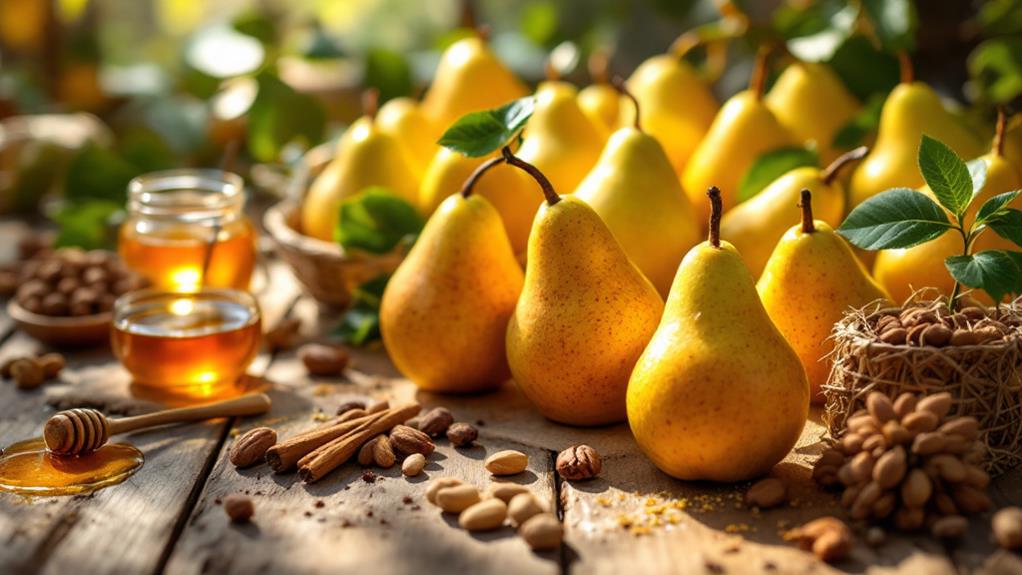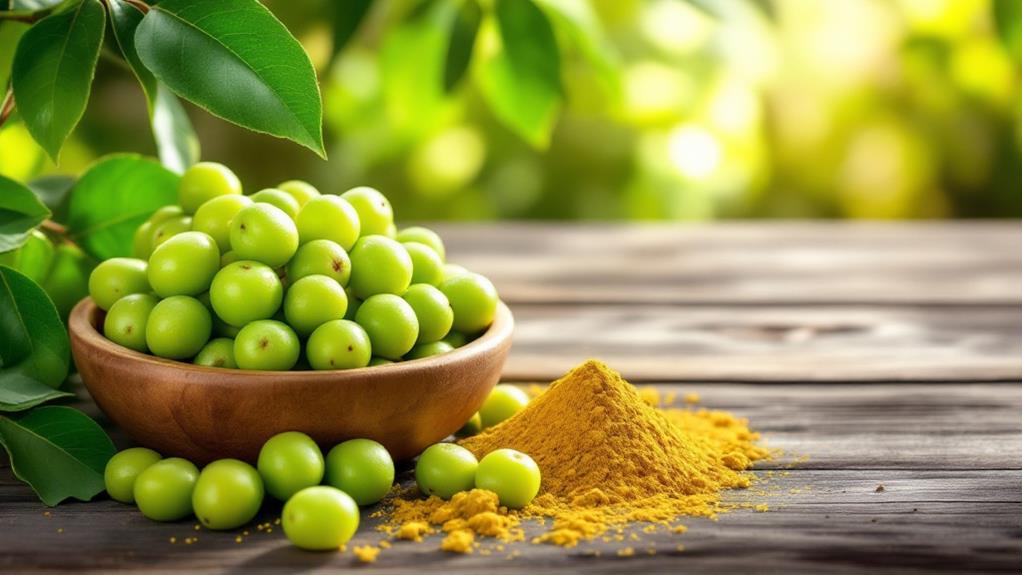Everything You Need to Know About Duku Fruit: Health Benefits and Uses
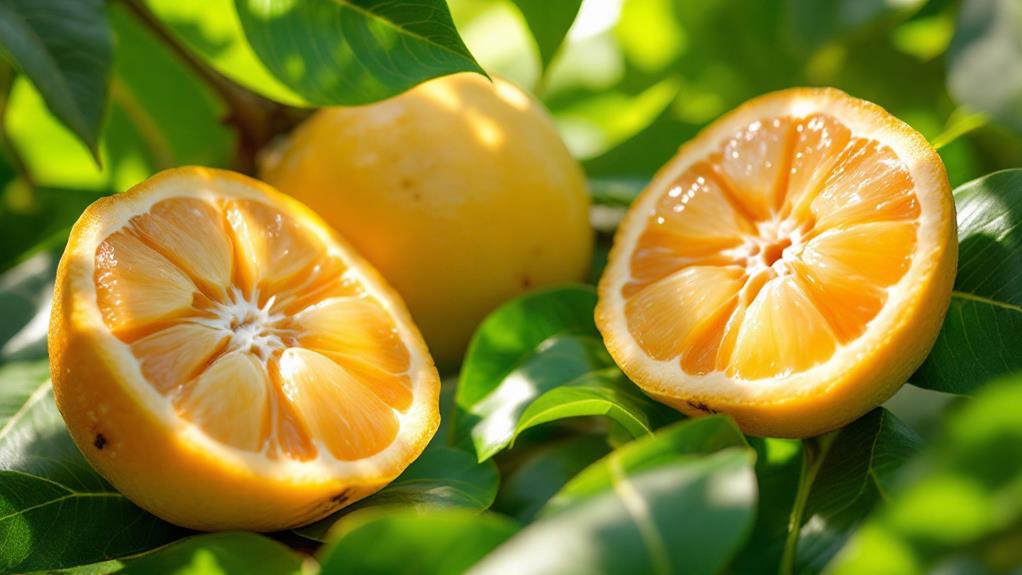
Duku fruit, native to Southeast Asia, is a nutritional gem you'll love incorporating into your diet. It's low in calories but high in vitamin C, which boosts your immune system and improves skin health. The fruit's dietary fiber supports digestion, while its minerals like calcium and phosphorus strengthen bones. In the kitchen, duku adds a sweet-tart flavor to fruit salads, juices, and desserts. It's versatile enough for both sweet and savory dishes. Available year-round and peaking in flavor from fall to early winter, it's a staple at local markets. Want to investigate its cultural significance and more culinary tips?
Duku Fruit Overview
Duku fruit, scientifically known as Lansium domesticum, is native to Southeast Asia and primarily cultivated in countries like Malaysia, Indonesia, and the Philippines. This tropical fruit is a staple in these regions, celebrated for its unique flavor and health benefits. As a tropical fruit, Duku grows best in humid climates typical of Southeast Asia, making it a regional favorite for those seeking a tasty and nutritious snack.
The fruit itself typically measures between 3-7 cm in diameter and has a thick, leathery rind that varies from tan to pale yellow. Once you peel away the skin, you'll find translucent white flesh divided into 1-5 juicy segments. Initially sour when unripe, Duku matures into a delightful sweet-tart profile, reminiscent of grapefruit and pomelo, making it a versatile addition to fruit salads and desserts.
Duku is rich in vitamins A, B, C, and E, and it provides vital minerals such as iron, phosphorus, potassium, and calcium. These components contribute to its health benefits, including supporting your immune system and promoting healthy skin. Enjoying Duku fresh is the best way to experience its full flavor and nutritional advantages.
Nutritional Composition
While enjoying Duku fruit's delightful flavor, it's crucial to contemplate its impressive nutritional profile. This tropical delight boasts a remarkable nutritional value, making it a fantastic enhancement to your diet. At just 34 kcal per 100 g, Duku fruit is a low-calorie snack, perfect for those mindful of their caloric intake. Don't let its low-calorie nature fool you, though, as it's packed with beneficial nutrients.
Duku fruit shines as a rich source of vitamin C, providing about 46 mg per 100 g. This key vitamin acts as a powerful antioxidant, supporting your immune system and overall health. Furthermore, the fruit contains dietary fiber, which aids digestion and promotes gastrointestinal health. Including Duku fruit in your meals can help guarantee you get enough fiber in your diet.
Moreover, Duku fruit contains crucial minerals that contribute to its nutritional value. With approximately 18 mg of calcium, 9 mg of phosphorus, and 0.9 mg of iron per 100 g, it helps support bone health and important bodily functions. While enjoying its sweet taste, you're also reaping its nutritional benefits, making Duku fruit a wise choice for your overall well-being.
Health Benefits
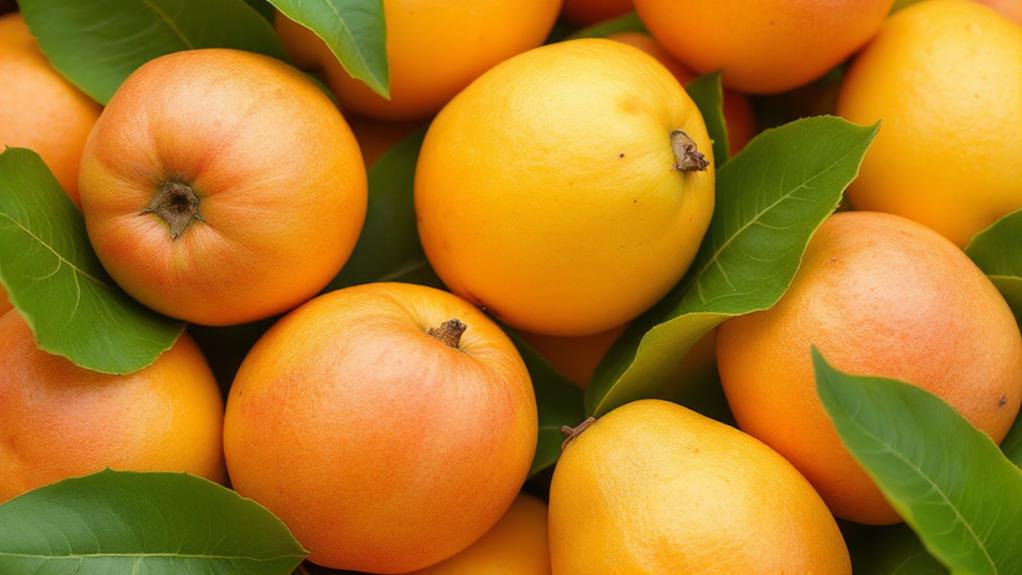
Ever wonder how a small fruit can pack such a powerful punch of health benefits? Duku fruit is your answer! This fruit is rich in vitamin C, offering about 46 mg per 100 g, making it a high in vitamin option that supports your immune system and acts as an antioxidant. You'll also find that Duku is a good source of dietary fiber, which aids digestion and promotes regular bowel movements. It's not just about vitamins and fiber, though. Duku contains vital minerals like calcium and phosphorus, important for maintaining strong bones and teeth.
Consider these impressive health benefits of Duku fruit:
- Immune Support: High in vitamin C, it enhances immunity and helps fight off infections.
- Digestive Health: Rich in dietary fiber, it promotes gastrointestinal health and regularity.
- Bone Strength: A good source of calcium and phosphorus that supports bone and dental health.
- Weight Management: Low calorie and high water content make it a perfect snack for hydration and weight control.
Moreover, the antioxidants, including polyphenols and flavonoids, in Duku may help combat oxidative stress, reducing the risk of chronic diseases. With so many health benefits, Duku is a worthy supplement to your diet!
Culinary Applications
The versatility of Duku fruit shines in the culinary world, offering a delightful balance of sweet and tart flavors that can improve a variety of dishes. You can enjoy this tropical fruit fresh, where its juicy segments make a perfect complement to fruit salads and desserts. The sweet-tart flavor of Duku fruit pairs wonderfully with other tropical fruits like mango and pineapple, and complements herbs like mint and basil, creating a revitalizing burst of flavor in any dish.
When it comes to making invigorating juices, Duku fruit is a fantastic choice. Simply peel off the easily removable rind, and you can use the juicy segments to whip up a tropical smoothie or a thirst-quenching drink. But don't stop there—Duku's culinary applications are vast. It can be transformed into jams, jellies, and syrups, providing a sweet-tart twist to breakfast spreads and pastries.
Moreover, Duku fruit isn't limited to sweet dishes. You can cook it with vegetables or other fruits, adding a unique tangy flavor to savory culinary dishes. Its adaptability in the kitchen makes Duku fruit a must-try ingredient for any food enthusiast.
Seasonal Availability
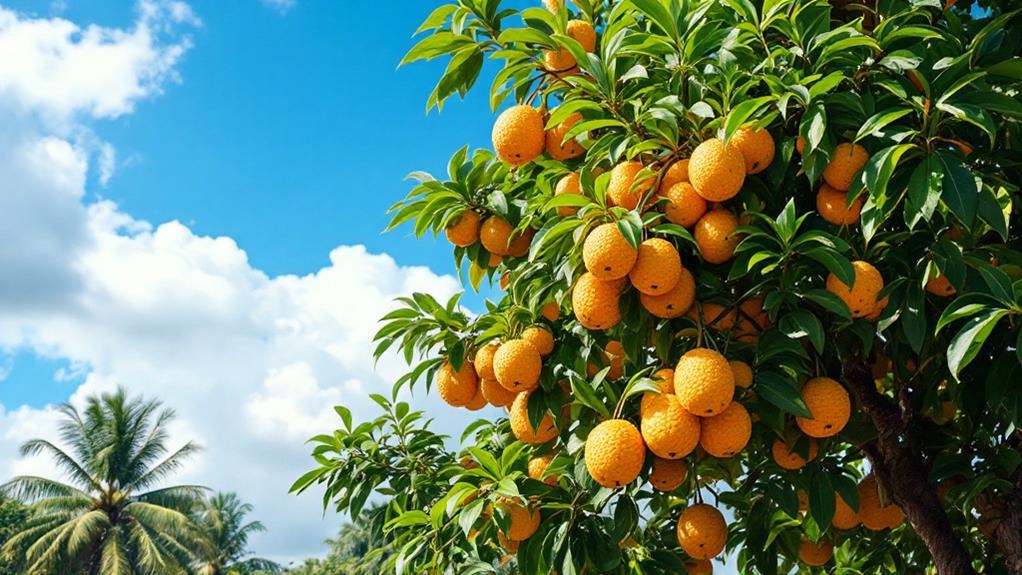
Seasonality plays a key role in the enjoyment of Duku fruit, as its availability can influence its flavor and appeal. In Southeast Asian countries, you can find Duku fruit year-round, making it a reliable choice for fruit enthusiasts. However, the peak season, running from fall through early winter, is when Duku fruit truly shines with improved sweetness and flavor. During this time, the fruit's natural sugars are more pronounced, giving you the best taste experience.
Duku thrives in humid, tropical regions, requiring specific conditions for ideal growth and fruiting. These conditions are met in numerous Southeast Asian countries, ensuring a steady supply throughout the year. When the fruit ripens to a yellowish-brown hue, it's usually time for harvest. You'll often spot Duku fruit in local and night markets during the peak season, reflecting its popularity and the cultural significance it holds in these regions.
Here are some key points about Duku fruit's seasonal availability:
- Year-round availability in Southeast Asian countries.
- Peak season improves sweetness and flavor.
- Thrives in tropical regions with humid climates.
- Commonly found in markets during peak season, reinforcing its popularity.
Enjoy Duku's health benefits by indulging during its prime!
Cultural Significance
Cultural significance envelops the Duku fruit, weaving it into the tapestry of Southeast Asian traditions and daily life. Known scientifically as Lansium parasiticum, this fruit is cherished not just for its delightful taste but for its role in diverse cultural practices. In the Philippines, the Camiguin Lanzones Festival is a lively celebration held every October, where the Duku harvest is marked by fruit samplings, dance performances, and local entertainment. This festival highlights the fruit's importance in fostering community spirit and hospitality.
In many Southeast Asian regions, Duku fruit is a symbol of welcome, often shared among neighbors and guests. The fruit's increasing popularity in local markets strengthens both the economy and the cultural identity of these communities. Beyond its social significance, Duku is also valued for its health benefits, with different parts of the plant used in traditional medicine to treat ailments like diarrhea and inflammation.
Duku's versatility extends to the culinary world, where it's a staple in traditional dishes and desserts. Whether enjoyed fresh or incorporated into recipes, the Duku fruit holds a special place in the hearts and kitchens of those in Southeast Asia.
Storage Tips

In regard to storing Duku fruit, keeping it fresh and flavorful is key. To make the most out of your Duku fruit, follow some simple yet effective storage tips. At room temperature, Duku fruit can ripen while maintaining its delicious flavor for about 3-4 days. However, if you wish to extend its shelf life, contemplate refrigerating it, where it can last up to a week. This will help preserve its freshness and maintain its unique texture.
Prevent bruising by handling the fruit gently. Avoid stacking them, as this can lead to unnecessary damage. Remember, consuming Duku fruit fresh is the best way to enjoy its sweet-tart flavor. Here are some storage tips to contemplate:
- Room Temperature: Store at room temperature for 3-4 days to ripen.
- Refrigeration: Refrigerate to extend shelf life up to one week.
- Gentle Handling: Handle with care and avoid stacking.
- Sunlight Avoidance: Keep away from direct sunlight in a cool, dry place.
Recipe Inspirations
Release the culinary potential of Duku fruit by incorporating it into a variety of delightful recipes. Start by enjoying Duku segments as a rejuvenating and healthy snack. Consumed fresh, this fruit contains a sweet and tangy flavor that's irresistible. For a lively twist, add it to a tropical fruits salad. Combine Duku with mango and pineapple for a colorful and mouthwatering dish that's sure to impress. The combination of sweet and tangy flavors will tantalize your taste buds and transport you to a tropical paradise.
If you've got a sweet tooth, use Duku as a dessert topping. Coat the segments in syrup and serve them over ice cream or pastries for an added layer of sweetness. This simple enhancement can raise any dessert into a gourmet experience. For a thirst-quenching treat, blend Duku with other fruits to create a revitalizing juice or smoothie. The fruit's unique flavor amplifies the tropical profile of any drink.
Lastly, try making Duku jam. Its sweet-tart flavor makes it perfect for spreading on toast or using as a pastry filling. With these recipe inspirations, Duku fruit transforms into a versatile kitchen star.



